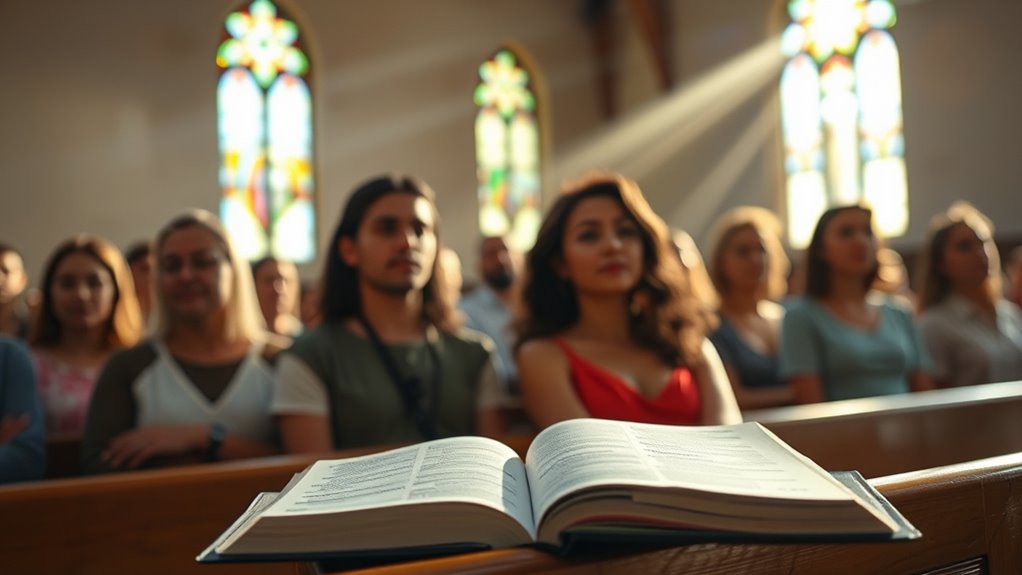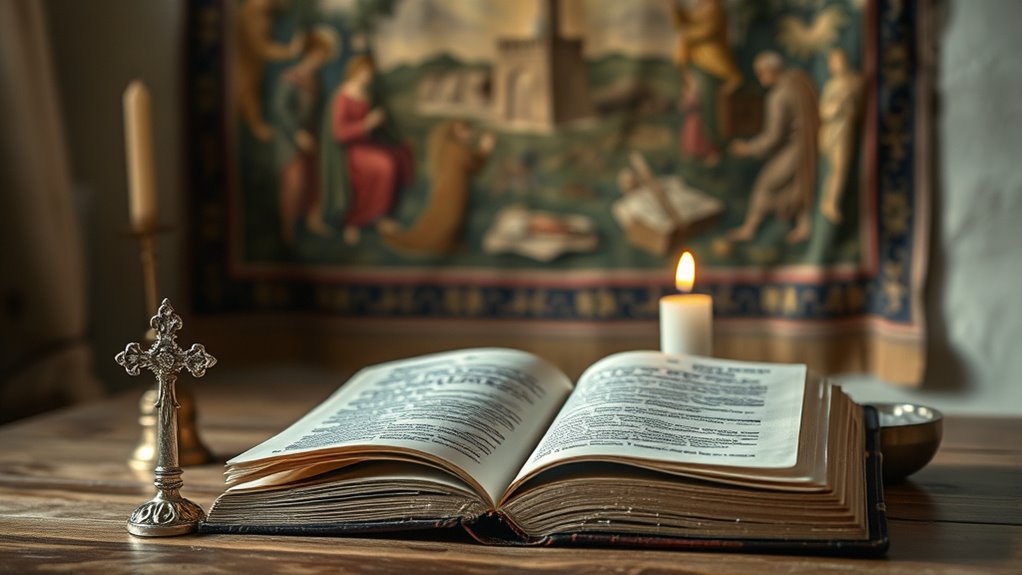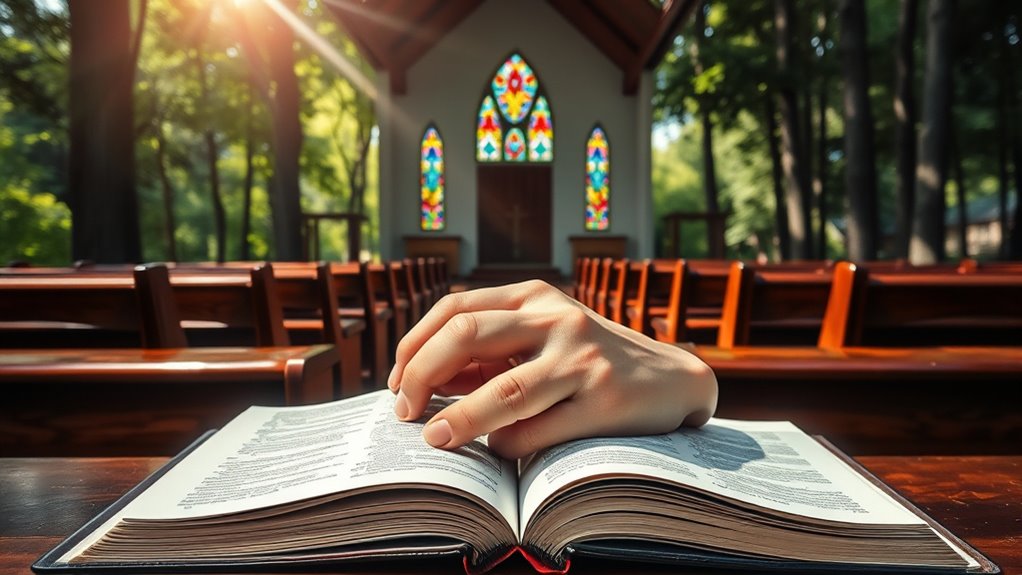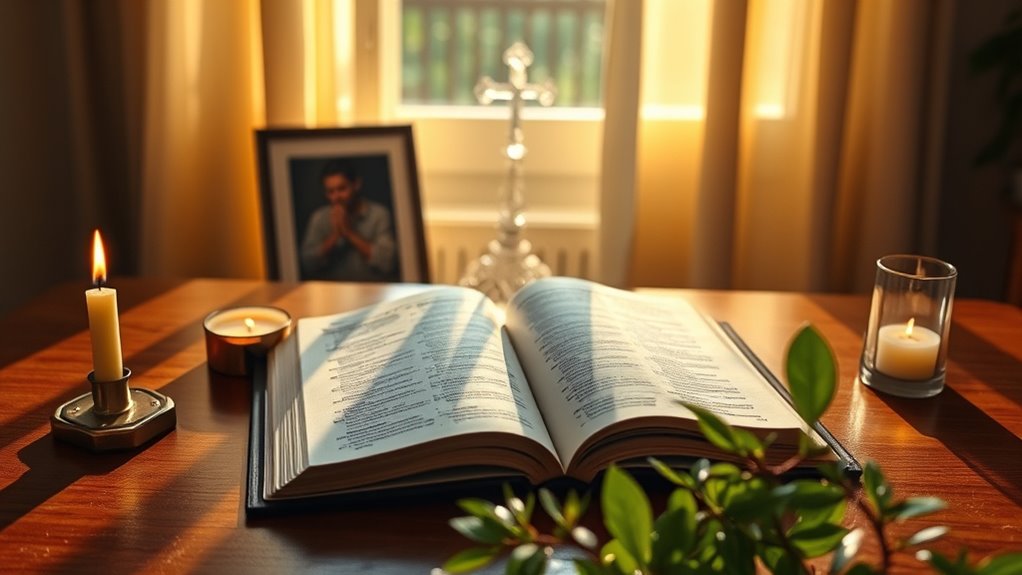Psalms, especially Psalm 91, have long been seen as powerful tools for protection, offering comfort during tough times. Many believers find solace in the themes of divine safeguarding and trust in God. The rich imagery and promises of safety resonate deeply, creating a sense of security against life’s challenges. While individual experiences may vary, the collective belief often reinforces their effectiveness. Discover more about how these sacred texts have shaped faith and provided protection over the years.
Key Takeaways
- Protective psalms, like Psalm 91, have historically been used for spiritual defense, offering believers a sense of security and divine protection.
- The rich imagery in psalms symbolizes safety, portraying God as a shelter and assuring believers of His safeguarding presence.
- Engaging with psalms regularly can foster emotional healing and spiritual growth, providing comfort during distressing times.
- Ritual recitation of psalms has been shown to promote inner peace, reinforcing trust in divine protection against various challenges.
- The cultural significance and timeless relevance of psalms across traditions underline their enduring role in spiritual practices for protection.
Historical Context of Psalms as Protection

Throughout history, protective psalms have served as powerful tools for spiritual defense, especially in Jewish traditions. You’ll find that psalms like Psalm 91 were historically employed to drive away demons and evil spirits, highlighting their protective role.
The Talmud even refers to Psalm 91 as a “song of evil spirits,” showcasing its significance in safeguarding against malevolent entities. These psalms often emerged during pivotal moments in Jewish history, such as the construction of the Tabernacle.
Additionally, archaeological findings, like the Dead Sea Scrolls, reveal that protective psalms were used in ancient exorcisms. Their integration into liturgical practices further emphasizes their enduring purpose in invoking divine protection, reinforcing the belief that faith can shield you from harm.
The Significance of Psalm 91

Psalm 91 stands out as a powerful declaration of faith and divine protection, offering comfort and reassurance to believers facing life’s uncertainties. It emphasizes trusting God during distress, portraying Him as a shelter and refuge.
You’ll find imagery of feathers and wings symbolizing His protective cover. The psalm lists universal dangers—arrows, pestilence, and terror—showing that those who trust in God can expect safety from these threats.
It also highlights angelic intervention, reinforcing the belief that you’re not alone in adversity. With promises of rescue and protection, Psalm 91 encourages you to maintain confidence in God’s love and sovereignty.
Ultimately, it’s a reminder that spiritual strength accompanies His physical protection, guiding you through life’s challenges.
Mechanisms of Protection in Psalms

The protective themes in the Psalms extend beyond mere declarations of faith; they reveal intricate mechanisms that foster a sense of safety and security.
You’ll find rich symbolic imagery, like the shelter of the Most High, painting a vivid picture of divine protection. Psalms emphasize angelic intervention, promising that angels guard you in all ways, particularly in Psalm 91.
They reassure you of safety from physical threats, offering God as a divine refuge. Imagery of treading on lions and serpents symbolizes your victory over danger.
Ultimately, these mechanisms are grounded in God’s faithfulness and love, inviting you to rest in His presence, where you’ll find comfort and assurance amid life’s uncertainties.
Emotional and Spiritual Impact on Believers

While traversing life’s emotional valleys, many believers find solace and strength in the Psalms. These sacred texts embrace a diverse emotional spectrum, validating your feelings of joy, despair, and everything in between.
When facing fear and stress, specific Psalms can offer comfort and hope, allowing you to confront these challenges head-on. The coexistence of doubt and faith is acknowledged, promoting emotional authenticity as you grapple with your feelings.
Engaging with the Psalms daily fosters spiritual growth, guiding you to integrate prayer and reflection into your routine. This practice nurtures trust in God’s character and strengthens your faith, providing resilience in adversity. Additionally, incorporating healthy lifestyle choices can enhance your overall well-being and support the emotional healing process.
Ultimately, the Psalms serve as a profound source of emotional healing and spiritual guidance.
Cultural and Historical Usage of Psalms

Throughout history, believers have turned to the Psalms not just for personal comfort, but also as an essential part of communal worship. In Jewish and Christian traditions, these sacred texts have shaped liturgical practices, from daily prayers to special occasions.
Traditionally attributed to King David and other authors, Psalms reflect the spiritual and cultural life of ancient Israel. Early Church worship embraced them, particularly in the Office of Vespers, where they were recited in full.
Over time, adaptations appeared in various musical styles, influencing both Protestant and Catholic practices. Whether in chant or modern hymn, the Psalms continue to resonate, underscoring their lasting significance in worship and community life across generations.
The Role of Faith in Perceived Effectiveness

When you turn to the Psalms for protection, faith plays an essential role in how effective you perceive them to be. Your trust in the promises laid out in passages like Psalm 91 can activate a sense of divine assurance, reinforcing your belief in protection.
Historical examples in the Bible, where figures like David experienced supernatural safety through faith, illustrate this connection. Additionally, your emotional comfort and reduced anxiety stem from believing in a higher power.
This faith not only shapes your perception of security but also helps build resilience against challenges. Engaging in prayer or reflection on these scriptures enhances your faith, making the Psalms feel even more potent in your life.
Community Support and Collective Belief

As you engage with your community, the power of collective belief becomes evident in the shared support and encouragement found within religious groups.
With 67% of adults valuing religion or spirituality, these communities foster strong cohesion and solidarity. High Cultural Intelligence (CQ) among community leaders can enhance the effectiveness of support networks, facilitating better understanding and empathy within diverse groups. Additionally, low light office plants can improve the ambiance of community spaces, promoting a calming environment. As part of community wellness initiatives, holistic approaches to health can provide members with comprehensive support.
Faith leaders often provide guidance, helping to normalize discussions around mental health, which can reduce stigma and encourage care-seeking behaviors.
Your participation in community activities—like charity work and civic engagement—can enhance your sense of purpose and connection. As members rally around shared values, you’ll likely experience improved mental health outcomes and a feeling of belonging.
Ultimately, collective belief not only strengthens individual faith but also fortifies the community, creating a supportive environment where everyone thrives. Engaging in mindfulness practices can further enhance community bonds and individual well-being.
Personal Experiences With Psalms for Protection

How do you find strength in the face of life’s uncertainties? Many turn to Psalms, discovering emotional comfort during tough times. As you recite these sacred verses, you might feel a sense of divine assurance, reinforcing your faith and providing spiritual strength against doubt and fear.
Regularly praying Psalms can reduce stress, helping you maintain a positive outlook even in adversity. You may find that Psalm 91 serves as a protective shield, fostering belief in angelic support and deliverance from harm.
Integrating these practices into your daily routine offers resilience, clarity, and a deeper spiritual connection, guiding you through life’s challenges while instilling confidence in your safety and well-being.
Variability in Interpretation Across Traditions

While interpretations of Psalm 91 vary across traditions, the essence of its protective message remains a unifying thread.
In Jewish tradition, you might find it used to ward off evil spirits, often inscribed on amulets or incantation bowls. Conversely, early Christians wrote parts of the psalm on papyrus for protection.
The Talmud emphasizes its role as a “song of plagues,” showcasing its power against negative forces. Both traditions share symbolic imagery, like wings providing shelter, which conveys divine protection.
Whether through liturgical recitation or personal devotion, the psalm offers spiritual comfort. Ultimately, each culture infuses its own significance, yet they all tap into the timeless theme of seeking divine safeguarding through this powerful scripture.
Frequently Asked Questions
Can Psalms Be Used for Protection Against Specific Dangers?
Yes, you can use psalms for protection against specific dangers. Each psalm addresses different fears and threats, providing comfort and strength.
For instance, Psalm 91 offers extensive promises of safety, while Psalm 23 reassures you of guidance.
How Do Different Faiths Interpret Psalms for Protection?
Different faiths interpret psalms for protection in unique ways.
In Christianity, you might see them as promises of divine intervention, emphasizing trust and faith.
In Judaism, psalms often serve as prayers for specific protection, connecting deeply to the Torah.
While both traditions value the themes of refuge and strength, cultural nuances shape how you engage with these texts, whether through prayer, meditation, or ritual practices, reinforcing your beliefs and spiritual needs.
Are There Particular Psalms for Different Types of Threats?
When life throws its shadows at you, certain psalms shine like guiding stars.
For physical threats, Psalm 91 wraps you in divine safety.
When anxiety grips you, Psalm 23 reassures you with God as your shepherd.
Facing spiritual battles? Psalm 91:13 empowers you to overcome adversaries.
Each psalm serves as a unique shield against various threats, reminding you of the strength and refuge found in your faith during challenging times.
Is There a Best Time to Recite Psalms for Protection?
You can recite Psalms for protection at various times to maximize their impact.
Daily prayers help maintain a spiritual connection, while evening reflections can provide peace before sleep.
During difficult moments or crises, turning to specific Psalms offers immediate comfort and support.
Incorporating them into your morning or evening routine allows you to build resilience and reinforce your faith, creating a protective shield around you as you navigate life’s challenges.
How Can I Incorporate Psalms Into My Daily Routine?
To incorporate Psalms into your daily routine, start your mornings with a few verses for reflection.
Use them during evening meditations to wind down. When you’re unsure what to pray, let the Psalms guide your words.
Try focusing on one Psalm each day for deeper contemplation.
You can also set reminders for daily readings or journal about the Psalms that resonate with you, making them a meaningful part of your spiritual journey.
Conclusion
In the tapestry of faith, the Psalms weave a protective thread that binds believers together. You find solace in their verses, like a warm embrace on a cold night. Whether they offer spiritual armor or simply a flicker of hope, their power lies in your belief. As you navigate life’s storms, remember that the strength of community and the whispers of ancient wisdom can guide you, turning vulnerability into resilience and fear into unwavering faith.









